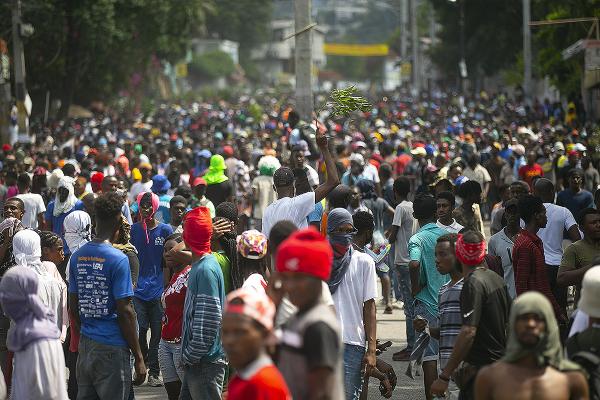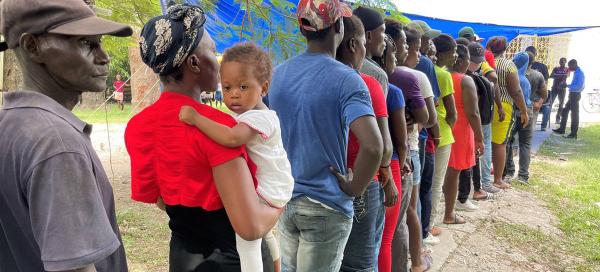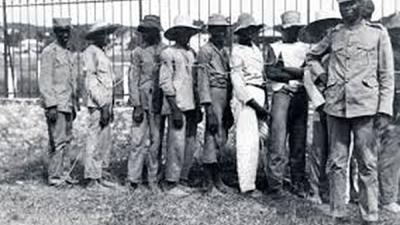As we post this week’s issue of Revolution, it appears very possible that some combination of imperialist powers/institutions—Canada, the U.S., and/or the UN—are going to invade Haiti. Such a move would be at the invitation and in support of the thoroughly illegitimate, unelected and widely despised “prime minister” of Haiti, Ariel Henry. 1

October 15, Port-au-Prince: Canadian plane carrying military supplies for Haitian National Police. Photo: @Pawelwargan/twitter
Henry, in a letter cosigned by 18 high-level officials in his government, called for foreign military intervention on October 7. According to the Associated Press, the letter requested the help of international troops, asking for “‘the immediate deployment of a specialized armed force, in sufficient quantity,’ to stop the crisis across the country caused partly by the criminal actions of armed gangs.”

Port-au-Prince, October 11: Men carry a woman shot by Haitian police during protest demanding the resignation of the prime minister. Photo: AP
To be clear, there is a very real and urgent crisis gripping Haiti at this time. (More on this crisis below.) But any intervention by the imperialist powers can only be aimed at continuing their domination of Haiti. And it is that very domination which has—over decades and over centuries—rained down hell upon the Haitian people again and again and produced the current intolerable situation.
While the precise response of key powers to this crisis and the shape of their military operations are still developing, the direction of things is clearly towards coming to Henry’s aid in some form or another. This may well include armed clashes with the gangs in the densely populated slums of the capital city of Port-au-Prince, as well as with the masses who are now protesting against the Henry regime and/or those who take to the streets to oppose any foreign intervention. As of October 16, the U.S. has said that it will support an intervention in a logistical capacity should the UN approve it (though it has, at least for now, ruled out sending combat troops).
On October 10, UN Secretary-General António Guterres submitted a letter2 to the UN Security Council (the body that makes decisions about deployment of UN armed forces) essentially saying that either UN member states (like the U.S. and Canada) should dispatch forces to Haiti, or if not, the UN as an organization should do so. On October 15, U.S. and Canadian armored cars and other military aid arrived in Haiti for the use of the Haitian National Police (HNP). And on that same day, the U.S. “drafted a United Nations Security Council resolution that would support the deployment of a rapid action force to Haiti immediately.”
Even if such an intervention serves in the very short run to ease the intolerable suffering of the masses a little bit, history has shown again and again that it won’t be long before it leads to even greater suffering. (See box, “A Brief Look at Imperialist Military Interventions in Haiti.”)
What is needed in Haiti is a thoroughgoing revolution, a communist revolution based on the new synthesis of communism developed by Bob Avakian. And the most urgent task of all those whose hearts ache and whose anger boils at the endless torments imperialism has imposed on the people of Haiti is to engage with, popularize, and apply this revolutionary science to the task of uprooting the oppressive system in Haiti, in close connection with the struggle to do that around the world.

The Crisis Facing the Masses
The situation in Haiti, and particularly Port-au-Prince, is extremely dire. For one thing, the country never recovered from the devastating earthquake in 2010 that killed hundreds of thousands of people and left many more homeless.3 Since then a series of earthquakes, hurricanes, floods and droughts have further damaged Haiti’s subsistence agriculture and weak industrial economy. Almost 24 percent of Haiti’s national income comes from “remittances” (money sent home by Haitians living abroad). Ten years ago it was about 12 percent. This is a marker of the crumbling of Haiti’s economy.

Haiti: Massive protests demand the resignation of Prime Minister Ariel Henry, Port-au-Prince, October 3, 2022. Photo: AP
As the economic crisis deepened, the widely despised government announced the elimination of fuel subsidies, causing the price of fuel—and food and other necessities transported by trucks—to skyrocket. Massive demonstrations erupted calling for Henry’s resignation—these demonstrations were attacked by the HNP and many were beaten or even killed.
As the government increasingly lost legitimacy as well as the ability to maintain a functioning society, a power vacuum began to open up. Into this jumped the major gangs, which already controlled Cité Soleil and other huge slums in Port-au-Prince. In September, one of these gangs (“G9 Family and Allies,” headed by ex-HNP sergeant Jimmy “Barbecue” Chérizier) blockaded the port, preventing fuel shipments from being delivered entirely.
All this has greatly intensified both the political and economic crisis. According to the UN, 4.7 million Haitians are now facing “acute hunger … including 19,000 in catastrophic famine conditions,” which means they are in imminent danger of starving to death. These 19,000 are all in the Cité Soleil slum, but hunger has even spread to the rural agricultural areas. Cholera is also beginning to spread.

Since cholera was first reported on 2 October 2022, there have been 357 suspected cases with more than half of these in children under 14. People queue for hygiene kits. Photo: UN
Chérizier likes to posture as a legitimate political leader fighting for the masses—he has joined the demand that Henry resign, and put forward his own plan for reorganizing the nation’s political structure. He has also demanded cabinet positions for his gang within the reactionary Haitian government.
Some Haitian leftists have bought into Chérizier’s claims, cheering him on as a revolutionary hero. But aside from the many credible reports that G9 (like other gangs) uses mass rape, murder and arson as weapons of terror to consolidate control of different slum areas, what kind of “revolutionary” uses starvation of the masses as leverage to get a cabinet position in an oppressive government?
So this is the crisis facing the masses: starvation, disease, police repression and gang terror, pushing millions to the very limits of human endurance… and beyond.
The Crisis Facing the Imperialists and Their Haitian Functionaries
The blockade of the port has greatly deepened the crisis confronting imperialism in Haiti. Since the fall (in 1986) of the pro-U.S. Duvalier dictatorship—which exercised terroristic control over the whole country—the U.S. has been unable to install a government that would both work well with the U.S. and keep Haiti relatively stable. The last few presidents have lacked almost any credibility among the masses of people, not least because they were seen as agents and props of the U.S.4
Now the tattered shreds of a state is losing all support, and the armed forces of the state are being outgunned by gangs that control a substantial amount of territory in the capital city and are able to put a chokehold on the national economy.
This level of economic crisis is very likely to lead to high levels of Haitian migration to the U.S., which both sections of the U.S. ruling class (the Republi-fascists and the Democrats) strongly fear and oppose. And, this level of disorder in a country right in America’s “backyard” creates openings for the U.S.’s global imperialist rivals—particularly China and Russia—to try to “fish in troubled waters” and gain influence in one way or another.5
The rulers of the U.S. do not care about the masses of people in Haiti (or anywhere else) except in the sense that the suffering of the masses can cause political instability or other “problems” for their empire.
But the current crisis in Haiti actually is very dangerous to U.S. imperialist “interests.” And it is those interests that it is now moving to protect—if necessary by spilling yet more Haitian blood and causing still more suffering.

A Brief Look at Imperialist Military Interventions in Haiti
The U.S. and its allies have intervened militarily in Haiti five times since 1915—always in the interests of “stability,” the “rule of law,” and, of course, “to protect the Haitian people”! In reality, all these interventions aimed to enforce the grip of imperialism on Haiti, and each one drove the masses of people in Haiti into deeper and deeper suffering.
- In September, 1915, the U.S. invaded Haiti and occupied it until 1934. Approximately 15,000 Haitians were killed for resisting the occupation.
- In October, 1957, after a decade of instability, Francois Duvalier (known as “Papa Doc”) became president of Haiti. He established a rule of absolute terror, enforced by the paramilitary Ton-Ton Macoute. Anyone suspected of even whispered dissent or who simply got in the way of the regime’s objectives could be hunted down, tortured, entombed for life in the regime’s dungeon at Fort Dimanche or have their whole family murdered. An estimated 50,000 people were killed by the regime. The U.S. backed Duvalier, especially after the Cuban Revolution in 1959, because of his violent anti-communism and because Duvalierist Haiti was a “stable environment” for U.S. exploitation of impoverished Haitian workers.
- When Papa Doc died in April 1971 he was replaced by his son Jean-Claude—“Baby Doc”—who continued the terror and worked with the U.S. to expand possibilities for capitalist-imperialist exploitation of the people. When his hated regime was finally overthrown in 1986, the U.S. rescued this monster. A U.S. Air Force jet flew flew him and his family to a safe exile in France.
- In September, 1991, under the administration of George H.W. Bush, “the CIA collaborated with local military forces to stage a bloody coup d’état,” against the elected government of the President Jean-Bertrand Aristide, which Bush considered to be at odds with U.S. interests. Under the new military regime of General Cédras, a reign of terror was set loose and thousands of Aristide’s supporters were killed, especially in slums like Cité Soleil that were his base of support.
- In September, 1994, President Clinton (elected in 1992) was critical of Bush’s coup against Aristide; Clinton thought Aristide could be brought under the wing of and become an asset to the U.S. Clinton assembled a naval armada and 25,000 troops to return Aristide to Haiti and compel General Cédras to hold free elections. However, this “gift” to Haiti was preceded by negotiations aimed at getting Aristide to act more in line with U.S. interests. Clinton basically felt that a “tamed” Aristide would be more valuable to the U.S. than a despised Cédras.
- After returning to Haiti, Aristide was elected president in a landslide, but while mainly accepting imperialist domination, he pushed back on some things. For instance, he insisted on friendly relations with neighboring Cuba (which the U.S. was trying to isolate) and he pushed for a higher minimum wage for Haitians being brutally exploited in (mostly foreign owned) factories. He also outraged France by demanding it repay $21 billion that France had extracted from Haiti in the 19th century as compensation for the French-owned enslaved people liberated by the Haitian Revolution. As the French ambassador would later acknowledge, this was one of the reasons the U.S. and France collaborated in yet another coup against Aristide, in February 2004. At the height of the coup, the U.S. abducted Aristide, put him on a plane and flew him to the Central African Republic.
- In June, 2004, a few months later, a UN force known as MINUSTAH occupied Haiti to “stabilize” the situation created by the U.S./French-backed coup. The MINUSTAH occupation lasted 13 years, ending in October 2017. It was “less a protection force in alliance with the Haitian people than a foreign intervention marked by callous disregard for the local population.” MINUSTAH troops were notorious for their brutality, and particularly for their sexual abuse of children and women. In addition they recklessly (though not intentionally) introduced cholera into Haiti’s rivers, causing an epidemic that sickened 820,000 and killed close to 10,000 Haitians.

